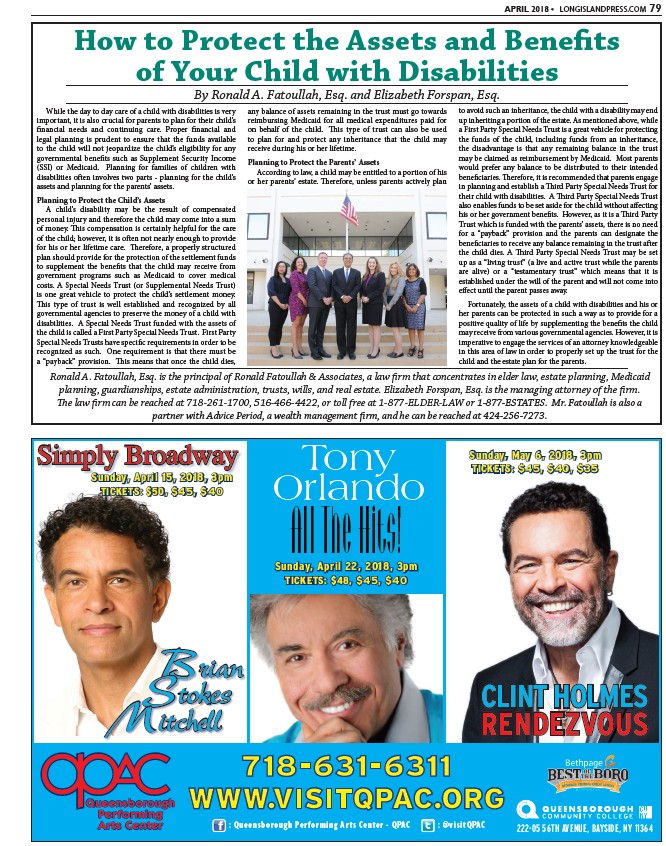
APRIL 2018 • LONGISLANDPRESS.COM 79
How to Protect the Assets and Benefits
of Your Child with Disabilities
By Ronald A. Fatoullah, Esq. and Elizabeth Forspan, Esq.
While the day to day care of a child with disabilities is very
important, it is also crucial for parents to plan for their child’s
financial needs and continuing care. Proper financial and
legal planning is prudent to ensure that the funds available
to the child will not jeopardize the child’s eligibility for any
governmental benefits such as Supplement Security Income
(SSI) or Medicaid. Planning for families of children with
disabilities often involves two parts - planning for the child’s
assets and planning for the parents’ assets.
Planning to Protect the Child’s Assets
A child’s disability may be the result of compensated
personal injury and therefore the child may come into a sum
of money. This compensation is certainly helpful for the care
of the child; however, it is often not nearly enough to provide
for his or her lifetime care. Therefore, a properly structured
plan should provide for the protection of the settlement funds
to supplement the benefits that the child may receive from
government programs such as Medicaid to cover medical
costs. A Special Needs Trust (or Supplemental Needs Trust)
is one great vehicle to protect the child’s settlement money.
This type of trust is well established and recognized by all
governmental agencies to preserve the money of a child with
disabilities. A Special Needs Trust funded with the assets of
the child is called a First Party Special Needs Trust. First Party
Special Needs Trusts have specific requirements in order to be
recognized as such. One requirement is that there must be
a “payback” provision. This means that once the child dies,
any balance of assets remaining in the trust must go towards
reimbursing Medicaid for all medical expenditures paid for
on behalf of the child. This type of trust can also be used
to plan for and protect any inheritance that the child may
receive during his or her lifetime.
Planning to Protect the Parents’ Assets
According to law, a child may be entitled to a portion of his
or her parents’ estate. Therefore, unless parents actively plan
to avoid such an inheritance, the child with a disability may end
up inheriting a portion of the estate. As mentioned above, while
a First Party Special Needs Trust is a great vehicle for protecting
the funds of the child, including funds from an inheritance,
the disadvantage is that any remaining balance in the trust
may be claimed as reimbursement by Medicaid. Most parents
would prefer any balance to be distributed to their intended
beneficiaries. Therefore, it is recommended that parents engage
in planning and establish a Third Party Special Needs Trust for
their child with disabilities. A Third Party Special Needs Trust
also enables funds to be set aside for the child without affecting
his or her government benefits. However, as it is a Third Party
Trust which is funded with the parents’ assets, there is no need
for a “payback” provision and the parents can designate the
beneficiaries to receive any balance remaining in the trust after
the child dies. A Third Party Special Needs Trust may be set
up as a “living trust” (a live and active trust while the parents
are alive) or a “testamentary trust” which means that it is
established under the will of the parent and will not come into
effect until the parent passes away.
Fortunately, the assets of a child with disabilities and his or
her parents can be protected in such a way as to provide for a
positive quality of life by supplementing the benefits the child
may receive from various governmental agencies. However, it is
imperative to engage the services of an attorney knowledgeable
in this area of law in order to properly set up the trust for the
child and the estate plan for the parents.
Ronald A. Fatoullah, Esq. is the principal of Ronald Fatoullah & Associates, a law firm that concentrates in elder law, estate planning, Medicaid
planning, guardianships, estate administration, trusts, wills, and real estate. Elizabeth Forspan, Esq. is the managing attorney of the firm.
The law firm can be reached at 718-261-1700, 516-466-4422, or toll free at 1-877-ELDER-LAW or 1-877-ESTATES. Mr. Fatoullah is also a
partner with Advice Period, a wealth management firm, and he can be reached at 424-256-7273.
Sunday, May 6, 2018, 3pm
TICKETS: $45, $40, $35 Simply Broadway
CLINT HOLMES
RENDEZVOUS
222-05 56TH AVENUE, BAYSIDE, NY 11364
Tony
Orlando
All The Hits!
Sunday, April 2 2, 2018, 3pm
TICKETS: $48, $45, $40
Brian Stokes Mitchell
718-631-6311
Sunday, April 15 , 2018, 3pm
TICKETS: $50, $45, $40
WWW.VISITQPAC.ORG
: Queensborough Performing Arts Center - QPAC : @visitQPAC
Queensborough
Performing
Arts Center